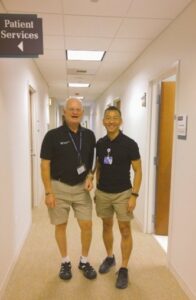
In a recent conversation with Dr. Paul Chiang, Senior Medical & Practice Advisor for Home Centered Care Institute (HCCI), I had the privilege of delving into the profound insights and experiences of a physician who has dedicated his career to the transformative practice of house calls. Dr. Chiang's words, filled with passion and empathy, paint a vivid picture of the unique and impactful nature of home-based primary care.
Dr. Paul Chiang's Journey and Contributions
Dr. Chiang's journey into home-based care is a testament to his commitment to serving the most vulnerable patients. As the Medical Director for Northwestern Medicine HomeCare Physicians (HCP), a suburban Chicago practice, Dr. Chiang made over 38,000 house calls to more than 3,900 patients during his 24-year career. His practice, which has made more than 142,000 house calls since its founding in 1997, focuses on delivering care to medically complex patients in their homes. Dr. Chiang's work has been recognized widely, including being named "House Call Doctor of the Year" by the American Academy of Home Care Medicine in 2019.
The Essence of Home-Based Primary Care
Dr. Chiang eloquently describes the essence of home-based primary care, emphasizing its holistic and patient-centered approach. He shares that being in a patient's home allows for a deeper connection and understanding of their needs, which is often missed in traditional clinical settings. "We often become part of the family," he says, highlighting the unique bond formed through house calls. This intimate setting enables patients to feel more comfortable and open, discussing serious matters such as end-of-life care and their personal struggles.
The Role of Nurses in Home-Based Care
A significant portion of Dr. Chiang's observation revolves around the indispensable role of nurses in home-based care. He praises the dedication and expertise of nurses, who are often the first point of contact for patients. These nurses address not only medical issues but also family dynamics and social determinants of health. Dr. Chiang's admiration for his nursing staff is palpable as he recounts their patience, knowledge, and ability to navigate complex care situations. "They are the lifeline to our patients," he asserts, underscoring their critical role in the success of home-based primary care.
Show Me Your Inhaler


One of the most compelling stories Dr. Chiang shared was about Anne, a 79-year-old patient with COPD, diabetes, kidney disease, and frailty. Like many of his patients, Anne had been in and out of the hospital due to COPD exacerbations. To help her manage her condition at home, Dr. Chiang prescribed a spacer device to improve the delivery of her inhaled medication.
Weeks later, Anne called again—her symptoms had worsened. Dr. Chiang made an urgent visit, only to discover that Anne hadn’t been using the spacer device or the inhaler. Embarrassed, she admitted she wasn’t sure how. The device had been assembled incorrectly, rendering it ineffective.
This moment was a revelation. “I thought I was helping her breathe better,” Dr. Chiang said, “but what she really needed was someone to take the time to show her how to properly use the inhaler and the spacer device so she can use the medication for her condition properly.
This experience led Dr. Chiang to refine his approach to medication management, especially in the home setting. He now recommends a six-step framework:
- Reconcile – Ensure the medication list matches what the patient is actually taking.
- Justify – Confirm each medication is still necessary.
- Deprescribe – Remove medications that are no longer needed.
- Optimize – Adjust dosages based on organ function and patient-specific factors.
- Demonstrate – Ask the patient to show how they take or use their medication.
- Educate – Provide clear, hands-on instruction to ensure proper use and the rationale behind each prescribed medication.
In Anne’s case, she didn’t need a new medication—she needed education. That simple act of teaching her how to use her inhaler correctly helped her avoid another hospital visit and empowered her to manage her condition more confidently.
Value-Based Care and Its Impact
Dr. Chiang also touches on the evolving landscape of healthcare, particularly the shift towards value-based care. He explains that this model focuses on patient outcomes, preventative care, and caregiver satisfaction, rather than the volume of services provided. This shift is particularly beneficial for home-based practices, which often struggle under the traditional fee-for-service model. Value-based care allows for better resource allocation, enabling practices to hire essential staff such as care navigators, social workers, and pharmacists, thereby improving patient care and reducing preventable ED or hospital visits.
The Emotional Toll and Support Systems
The emotional toll of witnessing suffering and death is a reality for Dr. Chiang and his team. He candidly shares how these experiences remind him of his own mortality and humanity, grounding him in his mission to provide compassionate care. Dr. Chiang finds solace and strength in his family, his Bible study group, and his faith, which help him navigate the challenges of his profession.
A Call to Support HCCI
Dr. Chiang's poignant words and heartfelt stories highlight the transformative impact of house calls on patients' lives. As HCCI strives to expand home-based primary care across the U.S., it is crucial to support this mission. Donors can play a vital role in ensuring that more patients receive the compassionate and comprehensive care they deserve in the comfort of their homes.
Dr. Paul Chiang's perspective as a physician and advocate for house calls serves as a powerful reminder of the importance of home-based primary care. His dedication to his patients and his commitment to improving healthcare delivery are truly inspiring. By supporting HCCI, we can help bring this transformative care model to more communities, making a profound difference in the lives of countless patients.


